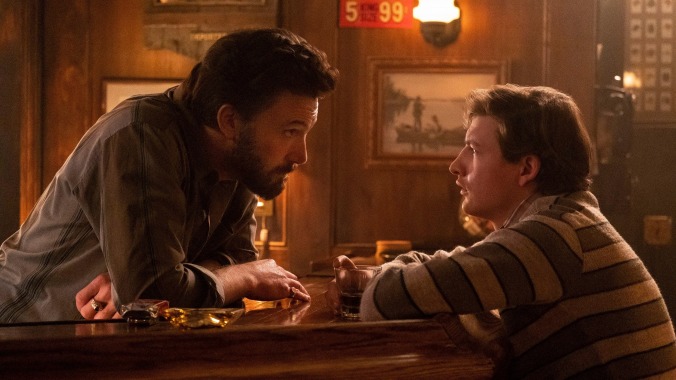Ben Affleck is the only thing remotely intoxicating about George Clooney’s The Tender Bar
This memoir adaptation is almost pointless enough to induce nostalgia for Clooney’s more self-important awards bait

What is it about attending Yale that makes people feel compelled to write entire memoirs explaining how they got there and what happened when they arrived? The Tender Bar, adapted from a memoir by J.R. Moehringer, is a somewhat less insufferable origin story than Hillbilly Elegy, but it’s scarcely more urgent—at least not in its big-screen telling. Holding most of its characters at a solipsistic remove, this is an extended personal essay in search of an application.
The applicant is the movie’s J.R., who takes on those initials to avoid the moniker “Junior,” and is supposedly in a constant search for his deadbeat father, Johnny (Max Martini). Johnny left J.R.’s mother (Lily Rabe) early, and as a professional disc jockey in confusingly high demand, he remains forever a “voice on the radio” for his mostly abandoned son. When J.R. is a boy, played by Daniel Ranieri, his weary but caring mom totes him back to her family home on Long Island, where his cantankerous grandfather (Christopher Lloyd) presides over a revolving cast of boisterous relatives.
This group includes J.R.’s Uncle Charlie (Ben Affleck), a local bartender and imparter of wisdom about the “male sciences.” Both a reader and a heavy drinker, Charlie offers advice both sensible (“don’t look for your father to save you”) and prescriptive (“don’t play sports,” cutting to the core of J.R.’s limited athletic abilities), all of which the movie romanticizes. He also points his nephew in the direction of books, which inspire his passion for writing—we’re told, anyway, because The Tender Bar keeps any tricky details of the creative process confined to a haze of vague barroom philosophizing.
In short, Uncle Charlie is the father that J.R. never had—so kind, warm, and aware of the story’s themes that he undermines the father-son estrangement that’s supposed to provide the movie’s dramatic backbone. Having established almost immediately that J.R.’s biological father is worthless and Uncle Charlie will step into that role, The Tender Bar dithers around as a kid grows into a mildly angsty young man (Tye Sheridan) who receives a coveted Yale scholarship. Escaping his roots, he then spends most of his undergraduate years pining after rich girl Sidney (Briana Middleton). Finally, a riveting peek into a young man’s crush on an aloof and emotionally unavailable woman!
A far bigger surprise than anything that happens in The Tender Bar: This glorified version of an indie wank like The Only Living Boy In New York comes from director George Clooney. Clooney has made some promising imitations of movies he admires and some awfully leaden retro exercises, but he’s never made something this feckless, this lacking in personality. The generic flimsiness only makes the occasional visual inspiration—like a visit between J.R. and his father that plays out primarily in a single shot from a camera strapped to the hood of a car—feel more out of place.
Even stranger, the movie’s off-key writing about writing comes from the pen of William Monahan, who has brought distinctive flavor to the dialogue of crime and crime-adjacent adaptations like The Departed, Edge Of Darkness, and The Gambler. Here, it’s hard to tell if Monahan’s phrasings are lifted from the book, poorly delivered by the young cast, or simply a result of his own writerly talent pickling too long in a brine of faux-sagacity. Regardless of source, the dialogue sticks out like bad prosthetics. Boozy and straight characters alike trade lines that sound like slurred speech that’s been cleaned up for grammar but not coherence; everyone seems to talk around each other, whether it’s J.R.’s hardscrabble family or Sidney’s “lower upper middle class” parents (a phrase that seems both inaccurate to those characters and nicked from The Simpsons).
The one performer in the ensemble capable of making this stuff sound like the good kind of bullshitting is Affleck. If The Way Back saw him grapple on screen with the drinking problem he seems to recognize from real-life struggles, The Tender Bar offers a crowd-pleasing flipside to the barfly lifestyle. Like its more serious counterpart, there’s perhaps a touch of secret vanity to Affleck’s work as Uncle Charlie—though maybe here it’s not so secret, given the relish with which he embodies the movie’s only likable character, drinking the audience’s obvious delight instead of booze.
Whatever his process, it works. A better movie would have either reoriented the story around Charlie’s Long Island bar or given him an emotional journey less telegraphed than his evolution from pretty nice to even nicer. “Are you any good at writing?” a minor character asks J.R. at one point when discussing his life’s ambitions. The near-stranger continues: “I fear sometimes the question is too-little asked.” On that point, The Tender Bar is spot-on.